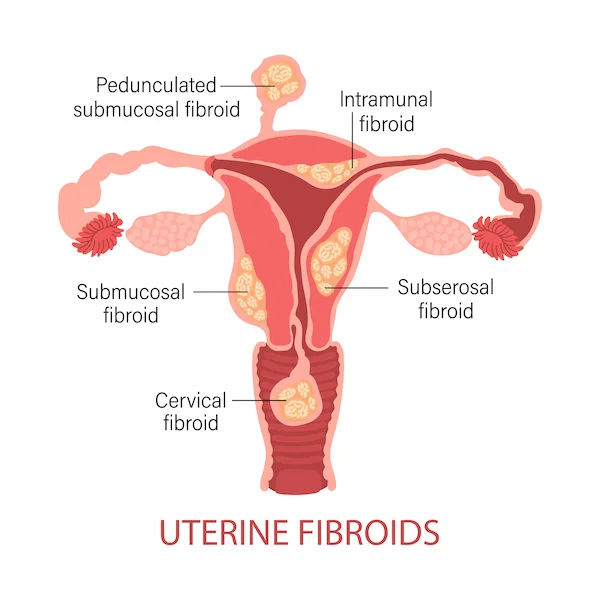Guide to Abnormal Uterine Bleeding
A comprehensive guide to understanding abnormal uterine bleeding (AUB), including its causes, symptoms, and various treatment options. Learn when to seek medical advice and how to manage this common gynecological condition effectively.


Introduction
Every woman's menstrual cycle is unique, but there's a difference between a "normal" irregularity and a sign that something might be off. Abnormal Uterine Bleeding (AUB) is a common gynecological concern that affects countless women, yet many are unsure if their experience qualifies or when to seek help. This comprehensive guide demystifies AUB, breaking down everything from what it is and its potential causes to the diagnosis and treatment options available. Whether you're dealing with unexpectedly heavy flow, spotting between periods, or unpredictable cycles, understanding the signs of abnormal uterine bleeding is the first step toward finding a solution and regaining control of your health. We’ll explore the symptoms you shouldn’t ignore and provide clear guidance on when to consult a healthcare professional.
What is Abnormal Uterine Bleeding (AUB)?
Abnormal Uterine Bleeding (AUB) is a broad term used to describe any deviation from the normal menstrual cycle. This includes changes in the frequency, duration, regularity, or volume of blood flow. While the occasional off cycle can be normal due to stress or lifestyle changes, AUB is typically persistent and disruptive.
How is AUB Different from a Normal Period?
A "normal" period typically occurs every 21 to 35 days, lasts for 2 to 7 days, and involves a total blood loss of about 30-40 milliliters (roughly 2-3 tablespoons). Abnormal uterine bleeding stands out. It might mean soaking through a pad or tampon every hour for several hours, needing to change protection during the night, passing large blood clots, or bleeding for more than a week. It also includes bleeding or spotting between periods, after sex, or after menopause.
Consult Top Specialists
Key Symptoms: How to Recognize Abnormal Uterine Bleeding
Recognizing AUB involves paying attention to patterns and changes in your body.
Changes in Your Menstrual Flow
• Heavy Menstrual Bleeding (Menorrhagia): Soaking through one or more sanitary pads or tampons every hour for several consecutive hours.
• Passing Large Blood Clots: Clots the size of a quarter or larger are a common sign of heavy menstrual bleeding.
• Bleeding that lasts more than 7 days.
Changes in Your Menstrual Timing
• Bleeding between periods.
• Cycles that are shorter than 21 days or longer than 35 days.
• Irregular periods where the cycle length varies significantly month-to-month.
Other Concerning Symptoms
• Bleeding after menopause.
• Bleeding after sexual intercourse.
• Symptoms of anemia, such as fatigue, tiredness, or shortness of breath, which can result from significant blood loss.
Common Causes of Abnormal Bleeding: The PALM-COEIN System
Doctors use the PALM-COEIN system to classify the causes of AUB. This system divides causes into two groups: structural (PALM) and non-structural (COEIN).
Structural Causes (The PALM Group)
These causes involve a physical or structural issue with the uterus.
• Polyps and Fibroids: Uterine fibroids and heavy bleeding are a well-known duo. These non-cancerous growths in or on the uterine wall can disrupt normal menstrual function. Polyps are smaller, often benign growths on the uterine lining.
• Adenomyosis: A condition where the tissue that normally lines the uterus (endometrium) grows into the muscular wall of the uterus, causing it to thicken and leading to painful, heavy periods.
• Malignancy and Hyperplasia: This refers to cancer (malignancy) or precancerous conditions (hyperplasia) of the uterus or cervix. While less common, it is a critical cause to rule out.
Non-Structural Causes (The COEIN Group)
These causes are related to function, hormones, or other medical conditions.
• Coagulation Disorders: Conditions that affect the blood's ability to clot, like von Willebrand disease, can cause prolonged menstrual bleeding.
• Ovulatory Dysfunction: When ovulation doesn't occur regularly (common in PCOS, thyroid disorders, or around perimenopause), it can lead to irregular, sometimes heavy, bleeding.
• Endometrial Issues: This refers to a problem with the function of the uterine lining itself.
• Iatrogenic Causes: Bleeding caused by medical treatments, such as certain medications (blood thinners, SSRIs) or intrauterine devices (IUDs).
• Not Otherwise Classified: Rare causes that don't fit elsewhere.
How is Abnormal Uterine Bleeding Diagnosed?
Diagnosing the root cause of AUB is a process that requires a medical professional.
Medical History and Physical Exam
Your doctor will start by asking detailed questions about your cycle, medical history, and symptoms. They will likely perform a pelvic exam.
Diagnostic Tests and Procedures
• Blood Tests: To check for anemia, thyroid function, hormone levels, and clotting disorders.
• Pap Smear: To collect cells from the cervix for testing.
• Ultrasound: A transvaginal ultrasound provides a clear image of the uterus, lining, and ovaries to look for fibroids or polyps.
• Endometrial Biopsy: A procedure where a small sample of the uterine lining is taken to test for cancer or hyperplasia. If your doctor recommends diagnostic tests, services like Apollo24|7 offer convenient home collection for blood tests, making the process easier.
• Hysteroscopy: A thin, lighted scope is inserted through the cervix to view the inside of the uterus.
Treatment Options for Abnormal Uterine Bleeding
Treatment is entirely dependent on the cause, your age, and whether you wish to have children in the future.
Medications and Hormonal Therapies
• Nonsteroidal Anti-inflammatory Drugs (NSAIDs): like Ibuprofen, can reduce blood loss and cramping.
• Tranexamic Acid: A medication that helps reduce blood loss by promoting clotting.
• Hormonal Birth Control: Pills, patches, rings, or hormonal IUDs are extremely effective at regulating cycles and reducing bleeding.
• Progesterone Therapy: Can help correct a hormonal imbalance and regulate the endometrial lining.
Surgical Procedures and Interventions
• Endometrial Ablation: A procedure to destroy the uterine lining, which significantly reduces or stops bleeding (not for women who want future pregnancies).
• Uterine Artery Embolization: A minimally invasive procedure to shrink fibroids by cutting off their blood supply.
• Myomectomy: Surgical removal of fibroids while preserving the uterus.
• Hysterectomy: The surgical removal of the uterus. This is a permanent solution that ends periods and the ability to bear children.
When to See a Doctor: Red Flags Not to Ignore
It's crucial to consult a doctor if you experience any of the following:
1. Soaking through a pad or tampon every 1-2 hours.
2. Bleeding for more than 7 days.
3. Bleeding between periods or after sex.
4. Bleeding after menopause.
5. Severe pain during your period.
6. Symptoms of anemia like dizziness, lightheadedness, or extreme fatigue.
If symptoms persist beyond two weeks or you experience severe pain or bleeding, consult a doctor online with Apollo24|7 for further evaluation and to discuss the next steps.
Consult Top Specialists
Conclusion: Taking Control of Your Gynecological Health
Abnormal uterine bleeding can be more than just an inconvenience; it can be a sign from your body that something needs attention. While it can feel overwhelming or embarrassing to discuss, remember that AUB is a common medical condition, not a personal failing. By understanding the symptoms and causes outlined in this guide, you are empowered to have an informed conversation with your healthcare provider. Effective treatments are available that can dramatically improve your quality of life. Don't hesitate to seek professional help to address your concerns, find the root cause, and explore the right treatment for heavy periods for you. Your health and well-being are worth it.
Consult Top Specialists

Dr. Rajib Ghose
General Physician/ Internal Medicine Specialist
25 Years • MBBS
East Midnapore
VIVEKANANDA SEBA SADAN, East Midnapore

Dr. Ajay K Sinha
General Physician/ Internal Medicine Specialist
30 Years • MD, Internal Medicine
Delhi
Apollo Hospitals Indraprastha, Delhi
(200+ Patients)

Dr. S Ananth Kumar
General Physician/ Internal Medicine Specialist
41 Years • MBBS; MD
Hyderabad
Apollo Hospitals Jubilee Hills, Hyderabad
(125+ Patients)

Dr. Mohammed Sharouk Khader
General Physician/ Internal Medicine Specialist
11 Years • MBBS, Bach. of Med. & Surg., Dip. of American Board of Family Med.
Chennai
Apollo Hospitals Greams Road, Chennai
(125+ Patients)
Dr. Indrajit Das
General Physician/ Internal Medicine Specialist
4 Years • "MD (Internal medicine) : Gauhati Medical College and Hospital, Guwahati (2018-2021) MD (Pathology) : Gauhati Medical College and Hospital, Guwahati (2012-2015) MBBS (Bachelor of Medicine, Bachelor of Surgery) : Silchar Medical College, Assam (2003-2008) "
Guwahati
Apollo Excelcare Hospital, Guwahati
Consult Top Specialists

Dr. Rajib Ghose
General Physician/ Internal Medicine Specialist
25 Years • MBBS
East Midnapore
VIVEKANANDA SEBA SADAN, East Midnapore

Dr. Ajay K Sinha
General Physician/ Internal Medicine Specialist
30 Years • MD, Internal Medicine
Delhi
Apollo Hospitals Indraprastha, Delhi
(200+ Patients)

Dr. S Ananth Kumar
General Physician/ Internal Medicine Specialist
41 Years • MBBS; MD
Hyderabad
Apollo Hospitals Jubilee Hills, Hyderabad
(125+ Patients)

Dr. Mohammed Sharouk Khader
General Physician/ Internal Medicine Specialist
11 Years • MBBS, Bach. of Med. & Surg., Dip. of American Board of Family Med.
Chennai
Apollo Hospitals Greams Road, Chennai
(125+ Patients)
Dr. Indrajit Das
General Physician/ Internal Medicine Specialist
4 Years • "MD (Internal medicine) : Gauhati Medical College and Hospital, Guwahati (2018-2021) MD (Pathology) : Gauhati Medical College and Hospital, Guwahati (2012-2015) MBBS (Bachelor of Medicine, Bachelor of Surgery) : Silchar Medical College, Assam (2003-2008) "
Guwahati
Apollo Excelcare Hospital, Guwahati
More articles from Uterine Bleeding
Frequently Asked Questions
1. Can stress cause abnormal uterine bleeding?
Yes, high levels of physical or emotional stress can disrupt your hormonal balance, potentially leading to missed periods, irregular cycles, or spotting. This is usually temporary, but if it persists, it's best to see a doctor.
2. What is the difference between a heavy period and a hemorrhage?
A hemorrhage implies an acute, massive, and dangerous loss of blood requiring immediate emergency care. Heavy menstrual bleeding (menorrhagia) is chronic and cyclical, though it can be severe enough to cause anemia. If you are soaking through two pads per hour for two consecutive hours, seek emergency care.
3. Are there home remedies for managing heavy period bleeding?
While home remedies like using a heat pad for cramps or taking iron supplements for anemia can help manage symptoms, they do not treat the underlying cause of AUB. It is essential to get a proper diagnosis from a doctor.
4. Can abnormal bleeding be a sign of pregnancy?
Yes, implantation bleeding in early pregnancy can cause light spotting. However, any bleeding during pregnancy should be evaluated immediately by a healthcare provider to rule out complications.
5. Is it normal to have irregular periods in your 40s?
Yes, as you approach perimenopause (the transition to menopause), hormonal fluctuations can cause irregular periods after 40, including changes in flow and timing. However, any new or concerning bleeding patterns should still be discussed with your doctor to rule out other causes.
.webp)
